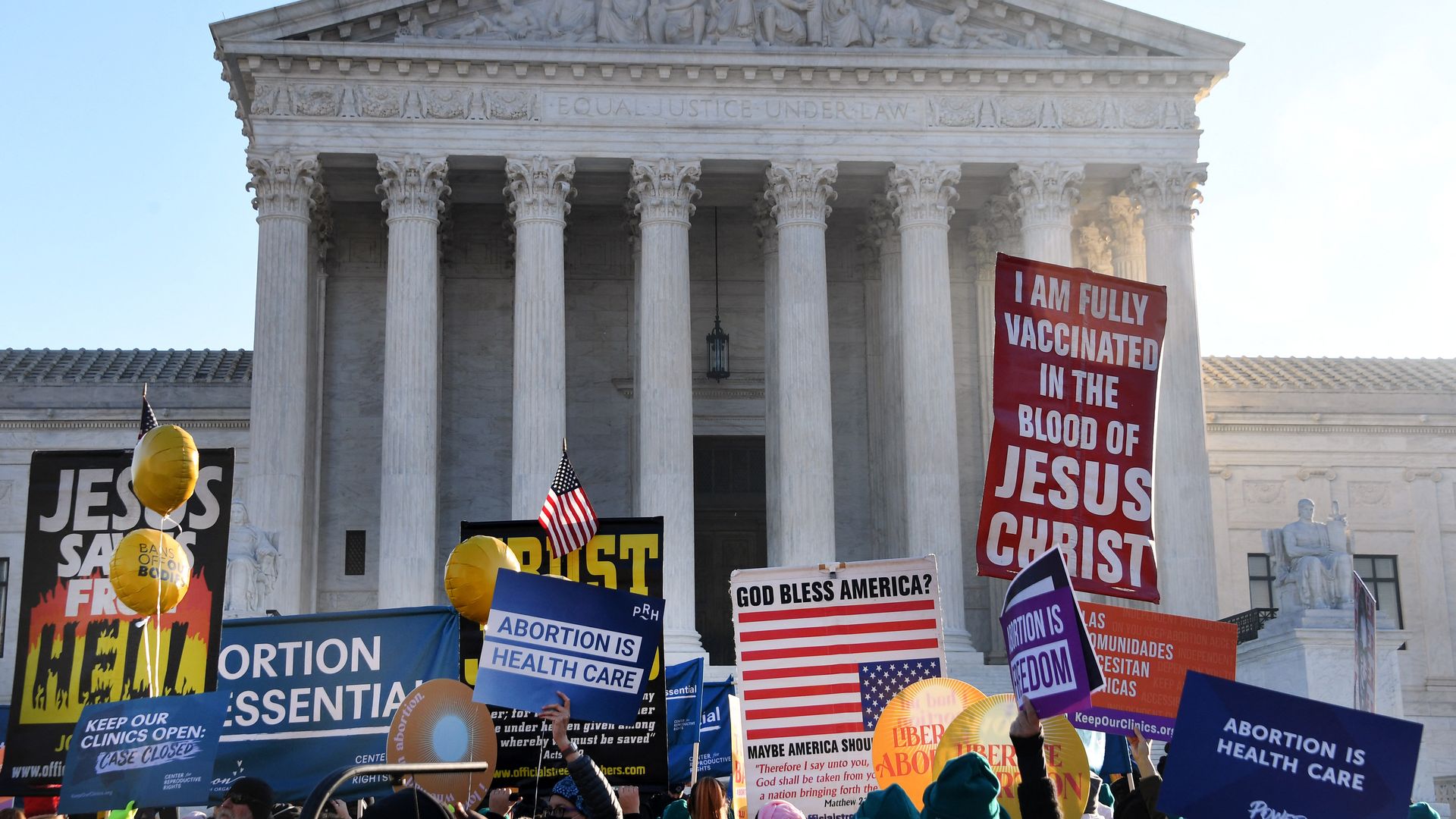Supreme Court appears likely to roll back abortion rights
Add Axios as your preferred source to
see more of our stories on Google.

Abortion rights advocates and anti-abortion protesters demonstrate in front of the Supreme Court in Washington, D.C., on Dec. 1. Photo: Olivier Douliery/AFP via Getty Images
The Supreme Court on Wednesday seemed likely to weaken abortion rights and perhaps to let states ban the procedure altogether.
The intrigue: The court seemed likely to throw out the framework established in Roe v. Wade, but it wasn't clear whether a majority of the justices were inclined to overturn the court's precedents entirely.
The big picture: The court heard oral arguments this morning in Dobbs v. Jackson Women's Health Organization, a case challenging a Mississippi law that bans abortions after 15 weeks. Mississippi seemed likely to win, one way or another.
- The court's main abortion precedents, Roe v. Wade and Planned Parenthood v. Casey, say that women have a right to an abortion until about the 24th week of pregnancy, when a fetus is considered viable.
- Chief Justice John Roberts and his conservative colleagues all questioned whether the "viability line" makes sense, indicating that they're inclined to do away with that standard.
Overruling the "viability line" standard "is the same as overruling Roe and Casey," said Julia Rikelman, an attorney representing Jackson Women's Health Organization, during a press call on Wednesday.
- "If there's no clear line for courts to enforce, many states will try to ban abortion earlier and earlier," she added.
Some justices seemed interested in going further. Justice Samuel Alito at one point during questioning said that "the fetus has an interest in having a life and that doesn't change from the point before viability to the point after viability."
- Justice Neil Gorsuch also criticized the court's "undue burden" standard, which prohibits abortion regulations that impose a "substantial obstacle" on access. Gorsuch said the standard is "unworkable" and difficult for courts to administer.
- Justice Brett Kavanaugh several times asked questions about whether the Supreme Court should remain neutral when it comes to abortion, suggesting that the issue should fall entirely to the elected branches.
Arguing on behalf of Mississippi, the state's solicitor general, Scott Stewart, argued that safe haven laws — which allow for a parent to forfeit responsibility for their child, giving way to adoption — along with access to birth control measures were valid alternatives for abortions.
- Justice Amy Coney Barrett seemed to agree with the adoption argument, asking how the growing availability of adoption changes the reliance interest in abortions.
- Solicitor general Elizabeth Prelogar, representing the U.S. government, said there is "nothing new" in terms of access to adoption as it has existed even before Roe and Casey.
- When referring to birth control measures, Prelogar added that since contraceptives are not completely effective, they cannot qualify as an alternative to abortion.
Stewart argued that, overall, the right to an abortion is not written explicitly in the Constitution and should therefore not be considered a constitutional right.
Justice Sonia Sotomayor shot back at Mississippi's interest in having the court overturn Roe, asking Stewart, "How is your interest anything but a religious view?"
- "The issue of when life begins has been hotly debated by philosophers since the beginning of time. It’s still debated in religions. So when you say this is the only right that takes away from the state the ability to protect a life, that’s a religious view, isn’t it?" she added.
- Alito interrupted Sotomayor's questions, saying that secular bioethicists also question when life begins.
What's next: A decision from the court is expected to come in June.
